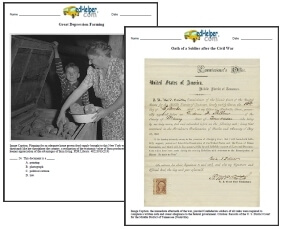
Worksheets and No Prep Teaching Resources
Reading Comprehension Worksheets
The 1970's

The 1970's
 Worksheets and No Prep Teaching Resources Reading Comprehension Worksheets The 1970's |
 The 1970's |
| edHelper's suggested reading level: | grades 5 to 7 | |
| Flesch-Kincaid grade level: | 6.48 |
|
Making Sense from a Computer
By Jane Runyon |

|
 1 Bill Gates wasn't a sports nut as a kid. He wasn't much of a musician, either. He wasn't like all the other kids he grew up with. Then how is it that he became the richest person on Earth as an adult? Bill Gates was in the right place at the right time with the right interests and a brilliant mind.
1 Bill Gates wasn't a sports nut as a kid. He wasn't much of a musician, either. He wasn't like all the other kids he grew up with. Then how is it that he became the richest person on Earth as an adult? Bill Gates was in the right place at the right time with the right interests and a brilliant mind. |
Create Weekly Reading Books
Prepare for an entire week at once! |
| Leave your feedback on Making Sense from a Computer (use this link if you found an error in the story) |
 |
The 1970's
|
 |
United States
|
|
|
 | Fifty States Theme Unit |
 |
Document Based Activities |